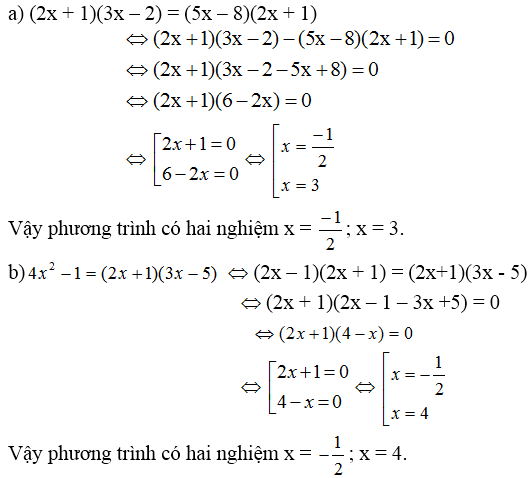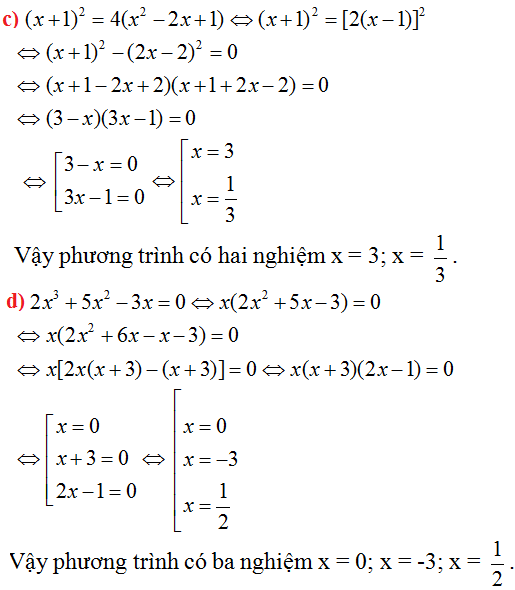Hãy nhập câu hỏi của bạn vào đây, nếu là tài khoản VIP, bạn sẽ được ưu tiên trả lời.

a)(2x+1)(3x-2)=(5x-8)(2x+1)
⇔(2x+1)(3x-2)-(5x-8)(2x+1)=0
⇔(2x+1)(3x-2-5x+8)=0
⇔(2x+1)(-2x+6)=0
⇔2x+1=0 hoặc -2x+6=0
1.2x+1=0⇔2x=-1⇔x=-1/2
2.-2x+6=0⇔-2x=-6⇔x=3
phương trình có 2 nghiệm x=-1/2 và x=3

\(a, 2x^2 + 5x + 10 = x^2 + 5x - 11\)
\(<=> x^2 + 21 = 0 \)
\(Do x^2 + 21 > 0\)
=> Pt vô nghiệm
\(b, 2x^2 - 6x + 7 = 0\)
\(<=> 2(x^2 - 3x+7/2)=0\)
\(<=> (x-3/2)^2 +7/4 = 0 \)
Tương tự như trên thì pt vô nghiệm
\(c, |x^2 + 3x+20| + |x-3| = 0\)
Ta có : \(|x^2 + 3x+20| = |(x+3/2)^2 + 17,75| > 0\)
\(=> |x^2 + 3x+20| + |x-3| > 0\)
=> Pt vô nghiệm

a/ ta có: 2(x+1)=3+2x
=> 2x +2 = 3+ 2x
=>2x-2x=3-2
=>0=1 (vô lí) =>đpcm
b/ 2(1-1,5x)+3x=0 =>2-3x+3x=0
=>0=-2 (vô lí ) =>đpcm
c/ vô nghiệm vì không có giá trị tuyệt đối nào mà kết quả là số âm

a) (x-1)(5x+3)=(3x-8)(x-1)
= (x-1)(5x+3)-(3x-8)(x-1)=0
=(x-1)[(5x+3)-(3x-8)]=0
=(x-1)(5x+3-3x+8)=0
=(x-1)(2x+11)=0
\(\Leftrightarrow\) x-1=0 hoặc 2x+11=0
\(\Leftrightarrow\) x=1 hoặc x=\(\dfrac{-11}{2}\)
Vậy S={1;\(\dfrac{-11}{2}\)}
b) 3x(25x+15)-35(5x+3)=0
=3x.5(5x+3)-35(5x+3)=0
=15x(5x+3)-35(5x+3)=0
=(5x+3)(15x-35)=0
\(\Leftrightarrow\) 5x+3=0 hoặc 15x-35=0
\(\Leftrightarrow\) x=\(\dfrac{-3}{5}\) hoặc x=\(\dfrac{7}{3}\)
Vậy S={\(\dfrac{-3}{5};\dfrac{7}{3}\)}
c) (2-3x)(x+11)=(3x-2)(2-5x)
=(2-3x)(x+11)-(3x-2)(2-5x)=0
=(3x-2)[(x+11)-(2-5x)]=0
=(3x-2)(x+11-2+5x)=0
=(3x-2)(6x+9)=0
\(\Leftrightarrow\) 3x-2=0 hoặc 6x+9=0
\(\Leftrightarrow\) x=\(\dfrac{2}{3}\) hoặc x=\(\dfrac{-3}{2}\)
Vậy S={\(\dfrac{2}{3};\dfrac{-3}{2}\)}
d) (2x2+1)(4x-3)=(2x2+1)(x-12)
=(2x2+1)(4x-3)-(2x2+1)(x-12)=0
=(2x2+1)[(4x-3)-(x-12)=0
=(2x2+1)(4x-3-x+12)=0
=(2x2+1)(3x+9)=0
\(\Leftrightarrow\)2x2+1=0 hoặc 3x+9=0
\(\Leftrightarrow\)x=\(\dfrac{1}{2}\)hoặc x=\(\dfrac{-1}{2}\) hoặc x=-3
Vậy S={\(\dfrac{1}{2};\dfrac{-1}{2};-3\)}
e) (2x-1)2+(2-x)(2x-1)=0
=(2x-1)[(2x-1)+(2-x)=0
=(2x-1)(2x-1+2-x)=0
=(2x-1)(x+1)=0
\(\Leftrightarrow\) 2x-1=0 hoặc x+1=0
\(\Leftrightarrow\) x=\(\dfrac{-1}{2}\) hoặc x=-1
Vậy S={\(\dfrac{-1}{2}\);-1}
f)(x+2)(3-4x)=x2+4x+4
=(x+2)(3-4x)=(x+2)2
=(x+2)(3-4x)-(x+2)2=0
=(x+2)[(3-4x)-(x+2)]=0
=(x+2)(3-4x-x-2)=0
=(x+2)(-5x+1)=0
\(\Leftrightarrow\) x+2=0 hoặc -5x+1=0
\(\Leftrightarrow\) x=-2 hoặc x=\(\dfrac{1}{5}\)
Vậy S={-2;\(\dfrac{1}{5}\)}

a) ĐKXĐ : x khác 2/5
\(\frac{2x+3}{2-5x}\le0\)
\(\Leftrightarrow2x+3\le2-5x\)
\(\Leftrightarrow7x\le-1\)
\(\Leftrightarrow x\le\frac{-1}{7}\left(\text{thỏa mãn}\right)\)
b) \(\left|5x+3\right|=\left|x+2\right|\)
\(\Rightarrow\orbr{\begin{cases}5x+3=x+2\\5x+3=-x-2\end{cases}}\)
\(\Rightarrow\orbr{\begin{cases}4x=-1\\6x=-5\end{cases}}\)
\(\Rightarrow\orbr{\begin{cases}x=\frac{-1}{4}\\x=\frac{-5}{6}\end{cases}}\)
P.s: cái này chưa học có j sai góp ý hộ nha ^^
ĐKXĐ: \(x\ne\frac{2}{5}\)
\(\frac{2x+3}{x-5x}\le0\)
Xét 2 trường hợp
TH1: \(\hept{\begin{cases}2x+3\ge0\\2-5x< 0\end{cases}\Leftrightarrow\hept{\begin{cases}x\ge-\frac{3}{2}\\x>\frac{2}{5}\end{cases}}}\Leftrightarrow x>\frac{2}{5}\)
TH2: \(\hept{\begin{cases}2x+3\le0\\2-5x>0\end{cases}\Leftrightarrow\hept{\begin{cases}x\le-\frac{3}{2}\\x< \frac{2}{5}\end{cases}}}\Leftrightarrow x\le-\frac{3}{2}\)
Vậy \(\orbr{\begin{cases}x>\frac{2}{5}\\x\le-\frac{3}{2}\end{cases}}\)
P/S: chưa học => trình bày thiếu sót ( sai ) => sửa hộ~

Bài 3:
a) \(\left(x-6\right).\left(2x-5\right).\left(3x+9\right)=0\)
\(\Leftrightarrow\left(x-6\right).\left(2x-5\right).3.\left(x+3\right)=0\)
Vì \(3\ne0.\)
\(\Leftrightarrow\left[{}\begin{matrix}x-6=0\\2x-5=0\\x+3=0\end{matrix}\right.\Leftrightarrow\left[{}\begin{matrix}x=6\\2x=5\\x=-3\end{matrix}\right.\Leftrightarrow\left[{}\begin{matrix}x=6\\x=\frac{5}{2}\\x=-3\end{matrix}\right.\)
Vậy phương trình có tập hợp nghiệm là: \(S=\left\{6;\frac{5}{2};-3\right\}.\)
b) \(2x.\left(x-3\right)+5.\left(x-3\right)=0\)
\(\Leftrightarrow\left(x-3\right).\left(2x+5\right)=0\)
\(\Leftrightarrow\left[{}\begin{matrix}x-3=0\\2x+5=0\end{matrix}\right.\Leftrightarrow\left[{}\begin{matrix}x=3\\2x=-5\end{matrix}\right.\Leftrightarrow\left[{}\begin{matrix}x=3\\x=-\frac{5}{2}\end{matrix}\right.\)
Vậy phương trình có tập hợp nghiệm là: \(S=\left\{3;-\frac{5}{2}\right\}.\)
c) \(\left(x^2-4\right)-\left(x-2\right).\left(3-2x\right)=0\)
\(\Leftrightarrow\left(x^2-2^2\right)-\left(x-2\right).\left(3-2x\right)=0\)
\(\Leftrightarrow\left(x-2\right).\left(x+2\right)-\left(x-2\right).\left(3-2x\right)=0\)
\(\Leftrightarrow\left(x-2\right).\left(x+2-3+2x\right)=0\)
\(\Leftrightarrow\left(x-2\right).\left(3x-1\right)=0\)
\(\Leftrightarrow\left[{}\begin{matrix}x-2=0\\3x-1=0\end{matrix}\right.\Leftrightarrow\left[{}\begin{matrix}x=2\\3x=1\end{matrix}\right.\Leftrightarrow\left[{}\begin{matrix}x=2\\x=\frac{1}{3}\end{matrix}\right.\)
Vậy phương trình có tập hợp nghiệm là: \(S=\left\{2;\frac{1}{3}\right\}.\)
Chúc bạn học tốt!

(1) cho A = 4,25 x(b + 41,53 ) - 125. tim b de A co gia tri =300 . (2)


a) ĐK: \(2x+2\ge0\Leftrightarrow x\ge-1\)
\(\left|2x+3\right|=2x+2\)
\(\Leftrightarrow\left[{}\begin{matrix}2x+3=2x+2\\2x+3=-2x-2\end{matrix}\right.\Leftrightarrow\left[{}\begin{matrix}2x-2x=2-3\\2x+2x=-2-3\end{matrix}\right.\)
\(\Leftrightarrow\left[{}\begin{matrix}0x=-1\left(vonghiem\right)\\4x=-5\end{matrix}\right.\Leftrightarrow\left[{}\begin{matrix}vonghiem\\x=\dfrac{-5}{4}\left(khongTMĐK\right)\end{matrix}\right.\)
vậy S=\(\varnothing\)
b)ĐK:\(5x-5\ge0\Leftrightarrow x\ge1\)
\(\left|5x-3\right|=5x-5\)
\(\Leftrightarrow\left[{}\begin{matrix}5x-3=5x-5\\5x-3=5-5x\end{matrix}\right.\)
\(\Leftrightarrow\left[{}\begin{matrix}0x=-2\\10x=8\end{matrix}\right.\)
\(\Leftrightarrow\left[{}\begin{matrix}vonghiem\\x=0,8\left(KhongTMĐK\right)\end{matrix}\right.\)
Vậy S=\(\varnothing\)